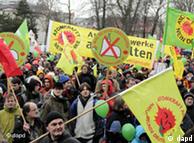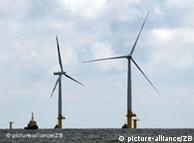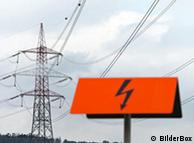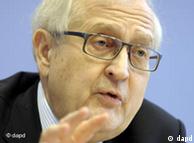 Ministry calls for large-scale expansion of energy gridIn the wake of Germany's nuclear review, the Economics Ministry is calling for an accelerated expansion of the energy grid. One priority would be high-voltage cables that could overcome shortcomings in renewable energy. Mar 27, 2011 - renewableenergyfocus.com German Economics Minister Rainer Brüderle has called for a massive modernization of Germany's energy grid to accommodate the planned development of renewable energy sources, such as solar and wind power. While Berlin has for some time said an expansion of the country's electricity grid is needed, the issue has taken on new urgency in the wake of the nuclear crisis in Japan and new German concerns over the safety of nuclear power. Brüderle has said he wants to pass a law to facilitate the construction of high-voltage transmission lines from northern Germany, where German wind farms are located, to the southern parts of the country, where populations are higher and most industry is located. Getting the go-ahead
The main obstacle to date has been the patchwork approval process for building transmission routes. Responsibility is currently shared between states and local communities, but this has resulted in delays, as residents - not keen to see high-voltage power lines run across their property - file lawsuits. "Because of legal wrangling, these kinds of projects can often take years or even decades to complete," Christoph Nesshöver, spokesman for the Institute of Energy Economics at the University of Cologne, told Deutsche Welle. "To remain credible, the government has to do something on this front, otherwise the expansion won't happen," he added. Brüderle wants to see a system of uniform rules put into place across the country. "The goal is to shorten the approval process," he said after a meeting of EU energy ministers in Brussels on Monday. The plans also foresee some kind of financial compensation for people affected by new network construction. Environment Minister Norbert Röttgen has also backed the plan, saying "accelerated expansion of the network is a central prerequisite for the expansion of renewable energies."
The need for a bigger, better grid has been known for some time. An Economics Ministry report on energy security published in January, before Berlin's nuclear back flip, found that Germany would likely have enough generating capacity to satisfy its energy needs until 2020, although the report did not rule out shortages if new power plants (including coal) were not built. The report added that the expansion of the energy grid and its transmission capacity would in any event be necessary. That need apparently has become all the more urgent in the wake of Chancellor Merkel's decision last week to shut down the country's seven oldest nuclear reactors and freeze her administrations' plans to extend nuclear power plants' lifecycles. Many observers have warned that the transition away from nuclear power to renewables could lead, at least in the mid-term, to higher electricity bills for consumers. According to estimates by the German Energy Agency, the construction of 3,600 kilometers of power transmission lines by 2020 would cost 9.7 billion euros. This could rise to 29 billion euros if companies lay cables underground. Energy companies would be expected to pass along any large scale investment costs to consumers. On Monday, Economics Minister Brüderle also pushed for a European-level expansion of the grid, something that has long been advocated by energy experts. Switching points between European countries have long hindered the transmission of energy across borders and slowed the development of a Europe-wide energy market. "We need a European solution to this problem," Klaus Jacob, who researches the economics of energy at Berlin's Free University, told Deutsche Welle. "Energy markets need to be opened much more to increase competition."
One large potential source of clean energy for Europe is Norway. It currently generates nearly all of its electricity through hydroelectric power, and according to the German environmental network DUH Norway potentially has the capacity to displace 60 nuclear or coal plants in Europe. The first step in this direction could be up and running by 2016-2017, according to NorGer, the company behind a project to build a high-voltage direct current (HVDC) sea cable between Germany and Norway. The cable will be able to transmit 1,400 megawatts of hydroelectric power to Germany, enough to replace at least one nuclear reactor. It would also offer the possibility of 'storing' wind energy in Norway at times of excess German capacity. For example, instead of turning off wind turbines when it is too windy, their energy could be used to power pumps to refill reservoirs in Norway, which could release their water at a later date. This would go a long way towards balancing out fluctuations in wind and solar energy, as the EU rushes to expand its share of renewables.
Although a spokesperson for NorGer said it was "very satisfied" with the support it had received from German authorities, a recent report by German public broadcaster ARD revealed that Brüderle's office has been reluctant to change German rules that are hindering the importation of cheaper renewable energy from abroad. The environmental organization Greenpeace is also skeptical of the government's real intentions. "We don't trust the government," Karsten Smid, an energy expert with the group, told Deutsche Welle. "Brüderle would like to expand the use of coal-fired power plants. We don't think they are really interested in making a switch to renewables." He agrees that Germany needs to modernize and expand its power grid, but it would like to see that done in conjunction with the decentralization of power generating systems. Locally tailored solutions - such as smaller wind farms, rooftop turbines and small cogeneration power plants - could also do a great deal to solve transmission bottlenecks, Smid said. Nuclear power plants still operating in the north, such as Brokdorf in the state of Schleswig-Holstein, could be repurposed, serving as transfer points for an expanded renewable energy network, he added. Author: Kyle James |
Email this page to a friend
If you speak another language fluently and you liked this page, make
a contribution by translating
it! For additional translations check out FreeTranslation.com
(Voor vertaling van Engels tot Nederlands)
(For oversettelse fra Engelsk til Norsk)
(Для дополнительных
переводов проверяют
FreeTranslation.com )





